Growing Farm to School in Ontario: workshop explores solutions to common challenges
Posted: March 12, 2019
Categories: Edible Education Network / GoodFoodBites / News from Sustain Ontario
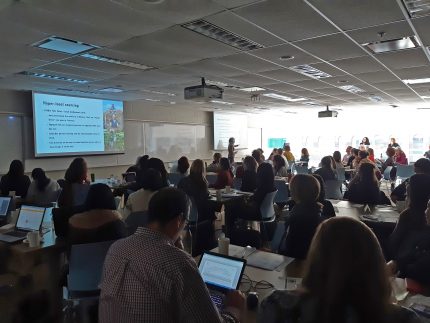 On February 28, 2019, Sustain Ontario hosted an interactive Farm to School (F2S) Workshop in partnership with the George Brown College Centre for Hospitality and Culinary Arts, which brought together some of the passionate people working on F2S activities in Ontario to explore solutions to common challenges.
On February 28, 2019, Sustain Ontario hosted an interactive Farm to School (F2S) Workshop in partnership with the George Brown College Centre for Hospitality and Culinary Arts, which brought together some of the passionate people working on F2S activities in Ontario to explore solutions to common challenges.
It was fantastic to have such a powerful mix of F2S champions together in one room — advocates from schools, school boards, student nutrition programs, non-profits, public health departments and government, as well as garden educators, farmers, academics and more — all networking, collaborating, learning and sharing with each other.
The group of more than 65 participants heard some inspiring and thought-provoking presentations on F2S best practices, models and research.
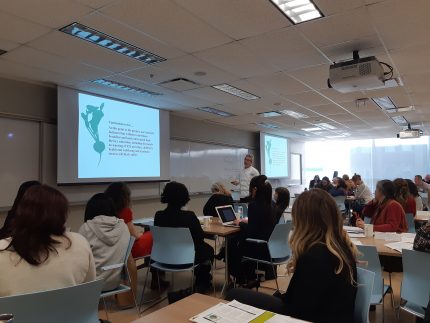 Gary Hoyer, Professor of Business and Hospitality Management at George Brown, presented on some of the research and findings so far from George Brown’s Generating Success for Farm to School Programs project.
Gary Hoyer, Professor of Business and Hospitality Management at George Brown, presented on some of the research and findings so far from George Brown’s Generating Success for Farm to School Programs project.
This project, which is investigating the diverse conditions necessary to support F2S activities while attempting to identify best practices for stakeholders, is still underway. An online survey has been designed for a variety of F2S stakeholders and can be accessed online here.
Lynn Roblin, Senior Policy Consultant with the Nutrition Resource Centre (Ontario Public Health Association – OPHA), then highlighted findings from OPHA’s Local Food Use and Food Literacy in Child Care and Student Nutrition Programs project.
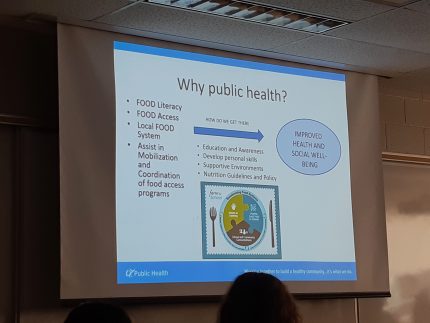 Afterward, presentations focused on common challenges that participants identified in a pre-event survey: Lyndsay Davidson with Chatham-Kent Public Health shared the value of a public health unit’s involvement; Rav Singh and Merissa Nudelman with Ecosource shared insights into evaluations and their importance; Jennifer Payne from Primrose Elementary School highlighted the farm to school framework and their school’s close relationship with a local farmer; and Soni Craik, SCC Consulting, and Eli Brown, Compass-Chartwells, discussed school board engagement.
Afterward, presentations focused on common challenges that participants identified in a pre-event survey: Lyndsay Davidson with Chatham-Kent Public Health shared the value of a public health unit’s involvement; Rav Singh and Merissa Nudelman with Ecosource shared insights into evaluations and their importance; Jennifer Payne from Primrose Elementary School highlighted the farm to school framework and their school’s close relationship with a local farmer; and Soni Craik, SCC Consulting, and Eli Brown, Compass-Chartwells, discussed school board engagement.
In the afternoon, we broke out into eight different roundtable discussions on each of the themes that emerged:
- Engaging School Boards
- Communicating the Benefits of F2S
- Local Food Purchasing
- Building a Strong F2S Team
- Metrics and Program Evaluation
- Food Production and Garden / Greenhouse Maintenance
- Student Participation
- Food Service
Each had rich discussion that was later shared with the rest of the group through “key takeaways.”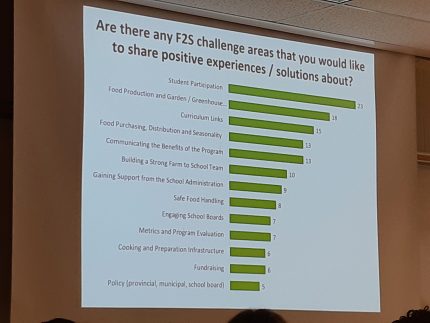
If you have thoughts on any of these themes, your own questions, or anything you’d like to share, we encourage you to join our ongoing #OntF2S discussion on Twitter. You’ll find some thoughts, questions and pictures from the workshop, and we have continued to share information since, including resources that were recommended throughout the day.
The F2S movement is growing more and more each year in Canada, as is its understood significance among more and more groups — Farm to School grows healthy students, schools and communities, as well as support for local farmers, environments and economies. So let’s keep the #OntF2S discussion going! 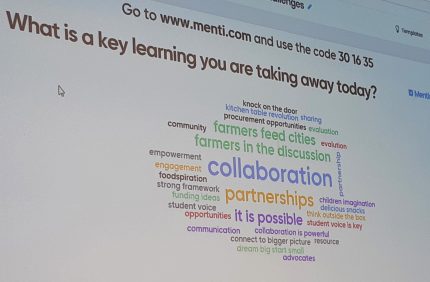
We would like to extend another big *thank you* to everyone who participated in the day, our wonderful presenters, and the George Brown College team for treating us so, so well. George Brown Hospitality & Culinary students provided us with incredibly delicious, healthy food throughout the entire day—it was F2S in action—and we could not have been more impressed!
